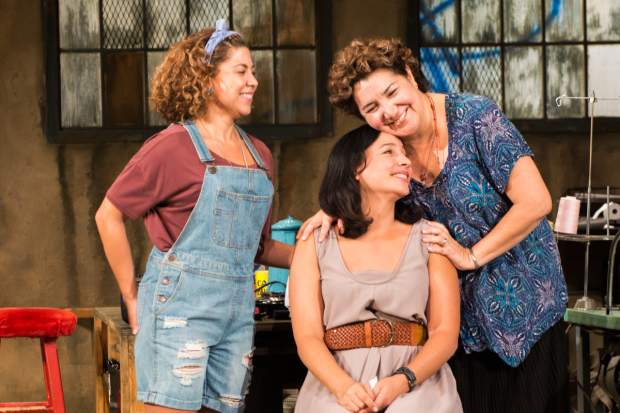Real Women Have Curves

(© Philicia Endelman)
Real Women Have Curves, Josefina López's reflection on the plight of garment workers in Los Angeles, began its life in 1990 at the Mission Cultural Center in San Francisco. Based on Lopez's experiences becoming a legal U.S. resident, the play was adapted into a Sundance Award-winning film in 2002. Now, to mark its 25th anniversary, López has updated her original play for modern times at Pasadena Playhouse.
Ana (Santana Dempsey), a recent high school graduate and budding writer, dreams of attending college in New York. But for now, she must work for less than minimum wage at the small garment factory her sister Estela (Cristina Frias) owns in East Los Angeles. At Estela's factory, Ana, her hyper-critical mother Carmen (Blanca Araceli), and their fellow workers Pancha (Ingrid Oliu), who feels less than a woman because she is barren and Rosali (Diana DeLaCruz), who exists only on diet pills and water. Most have recently received their legal residency, and, despite knowing they are now safe, they still fear U.S. Immigration and Customs Enforcement after years of hiding and avoiding every unmarked van.
The crux of López's play is passionate and celebratory, a mood she captures poetically. Forever haunted by their past as undocumented immigrants, the women are forced to shatter those imaginary chains still imbedded in their thoughts. The play's title comes from the through line where Ana's fellow workers empower her (and the audience) to ignore fat shaming and to love themselves.
It's apparent why this 1987 play might still feel timely, particularly with immigration being a hot topic. But updating the story causes some plot issues. The story has not been heavily altered to reflect the modern period, other than characters having cell phones and a calendar on the desk revealing the date. By moving the timeline to 2015, this allowed for several characters to receive legal residency thanks to the Immigration Reform and Control Act of 1986 (which included amnesty for undocumented workers). However, in the last few years, amnesty has been granted less often.
It is also peculiar that one character suffers from an eating disorder, but we're never told which one, and not only is anorexia not mentioned, but the character quickly snaps out of it — curing an eating disorder takes more than an afternoon and a box of KFC.
Even without the change in decades, the play remains so overstuffed with plot points that the characters receive only superficial treatment. The heavy issues touched upon, like spousal abuse and eating disorders, deserve more exploration if they are to be raised.
A similar rigidity is enforced by Seema Sueko's direction. The actresses talk at each other with stiff, stilted language as opposed to letting the dialogue flow naturally. It is difficult for an audience (and the actors themselves) to remain engaged when everyone is hyperaware of the acting taking place onstage.
The five women are most relaxed when they're moving through plot action, such as when they lust after Estela's inamorato, hide from a possible ICE inspection, or perform their tasks in unison to the beat of music. They also capture the oppressive heat in the dank room with their movements. One can feel the stickiness that covers them.
Sueko arms herself with excellent stagecraft. David F. Weiner's set is realistically grimy and colorless. Josh Epstein's harsh lighting design conveys the airless room on one of the hottest days of the year. Abel Alvarado's costumes are playful, representing both the banality of daily routine, and, in the Act 2 finale, stylish designs that project that real women can have some sharp curves.
Presenting López's play in its original time period could have allowed audiences a greater comprehension and emotional understanding regarding outsourcing, building walls, and deportation, and the destructive effects they have. But having reset her play in 2015, Lopez would have made her play more intriguing if she had examined how this close-knit group of women felt about being demonized for political fodder. That would have really given audiences something to ponder.











